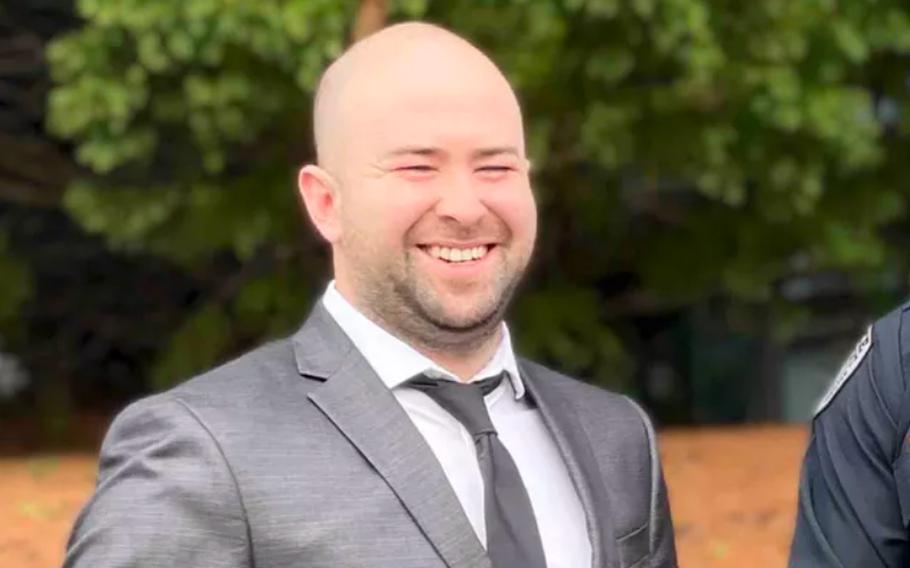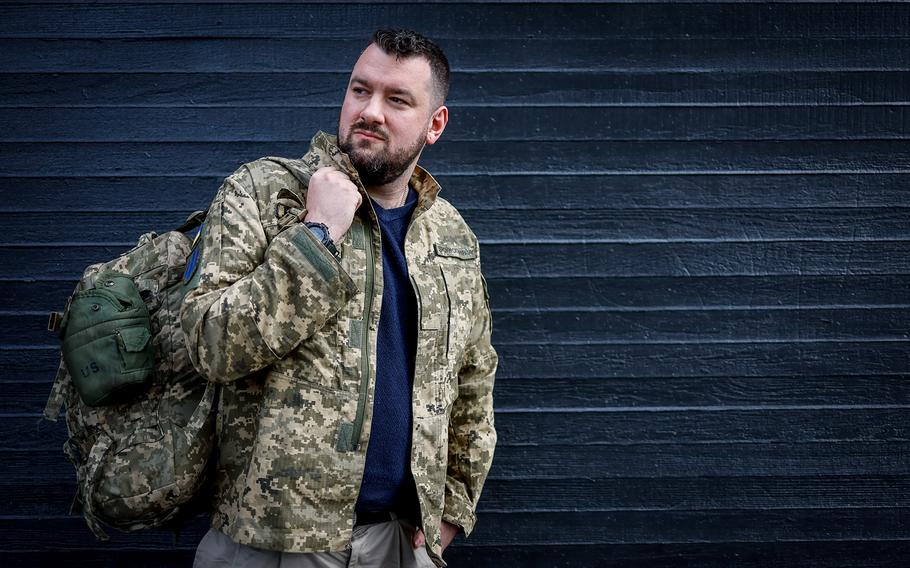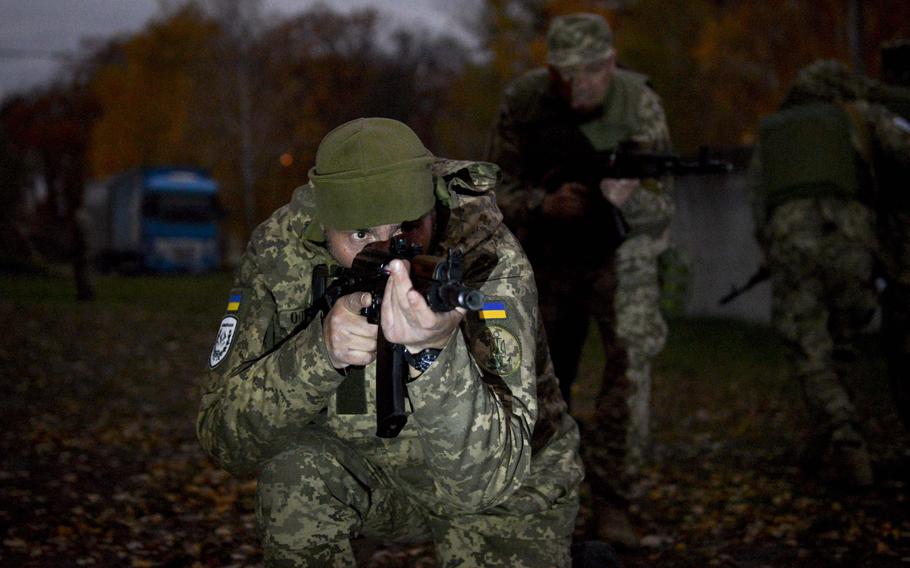
Steve Munroe is one of two Washington men who died fighting for Ukraine’s International Legion. (gofundme.com)
(Tribune News Service) — They flew to Poland, then drove for 18 hours, through a war zone, to say goodbye to Steve Munroe.
The 33-year-old had left Washington seven months earlier to fight in Ukraine. He now lay dying in a Kharkiv military hospital. If his fiancée and mother wanted to come, despite the danger, he would be kept on life support. “[Neither] his mom nor I could say no to that,” recalled his fiancée, Adrian Perry.
They left Warsaw at 4 a.m., crossed into Ukraine and drove east toward the front, into a surreal landscape of bombed-out buildings, decimated towns and military roadblocks. They arrived at 10:30 p.m., but it was too late.
“When we got there, we were told he had actually passed five hours before,” Perry said. His heart had given out.
Munroe, who worked in private security and lived in Puyallup and Chehalis, where Perry was a park ranger, is one of two Washington men who died fighting for Ukraine’s International Legion — the force of people from around the world who answered President Volodymyr Zelenskyy’s call to help beat back the Russian invasion that began in February 2022.
Like Munroe, Skyler Gregg was killed last October. Gregg grew up on Orcas Island, had no previous military experience and was 23 years old.
Few American fighters appear to have lost their lives in Ukraine, making Washington’s casualty count all the more remarkable. Press reports have identified at least eight slain Americans — including Gregg but not Munroe, whose death has not been previously reported.
Unlike U.S. military soldiers killed in action, Americans who die in Ukraine receive little or no official fanfare. The International Legion rarely confirms deaths and did not answer questions about Munroe and Gregg. A spokesperson declined to provide an overall casualty count.
The opaqueness is part and parcel of a fighting force that Ukraine hastily assembled in the early days of the war, offering the same salaries earned by Ukrainian soldiers. (Reports of pay range from $300 to roughly $3,000 a month.) Thousands streamed into the country, prompting some to compare the influx to that of foreign volunteers fighting fascism in Spain’s civil war during the 1930s.
Estimates of how many foreigners came to Ukraine to fight vary widely. Ukraine has said 20,000. “My take would be 2,000 actually fought in the legion,” said Kacper Rekawek, a postdoctoral fellow at the University of Oslo’s Center for Research on Extremism.
Despite uneven military experience, many were dispatched into the heart of Europe’s bloodiest war since World War II. They achieved tactical successes “here and there,” Rekawek said.
But in a March report, Rekawek also cited “a string of organizational and structural issues,” infighting and “improvisational” fighting — especially early on — that felt like chaos to many foreign fighters. Several Washingtonians who returned home after stints in the legion echo some of Rekawek’s observations.
The U.S. State Department has advised Americans not to travel to Ukraine and provides little information about those who go anyway.
“Our ability to verify reports of deaths of U.S. citizens in Ukraine is extremely limited,” an agency spokesperson wrote by email in response to questions about Munroe and Gregg, adding that not all deaths are reported to American authorities.
Loved ones of the Washingtonians, however, say American and Ukrainian officials called to notify them.
They weren’t told much. “I just wanted to know what happened,” Perry said.
As the shock has worn off, questions linger. Gregg’s mom, Michele Elliott-Gregg, said she wonders about her son: “Did he die instantly?”
“Zelenskyy said if anybody is willing to fight for Ukraine, they’re accepting volunteers. What do you think?” Jeremy Smith texted Munroe from Spokane days after Russia’s invasion.
“Let’s do it,” Munroe texted back.
“And that was about it,” Smith recalled. “We started getting our affairs together.”
The two became friends working as private security firearms instructors for the Washington State Criminal Justice Training Commission. Munroe and Smith had also worked as bail enforcement agents. And Munroe took private security gigs, including for small businesses and media around the 2020 Capitol Hill protest zone known as CHOP, set up after George Floyd’s killing by Minneapolis police.
Incensed by Russia’s aggression, Smith thought Munroe would be, too. “He had no problem sticking up for people who couldn’t stick up for themselves.”
Munroe’s fiancée said he believed that “if you have the skills and the ability to help others, then you should.”
Munroe’s combat skills came from five years in the French Foreign Legion during his early 20s. A history buff fascinated by warfare, he had wanted to serve in the U.S. military, Perry said, but was hampered by a criminal record from his youth. Court records show convictions for unlawful firearm possession, harassment and other charges.

Aaron Clark, seen here in Seattle on March 10, 2023, volunteered for International Legion in Ukraine during the early days of the war. With no military experience, he thought the Ukrainians would turn him down but instead was sent to the frontlines in Eastern Ukraine, where he spent about a year. (Kevin Clark, Seattle Times/TNS)
“He definitely saw action over there,” Perry said of Munroe’s time in the French Foreign Legion, though she isn’t sure where he went or what he did. “When he would kind of start talking about it, it would get him upset.”
Whatever trauma Munroe experienced, it didn’t fully prepare him for Ukraine.
“He said it’s the worst thing he’s ever seen in life,” said Andrew McKellips, a friend and co-owner of a private security company Munroe worked for. Perhaps, Perry said, Munroe was simply more mature in Ukraine, better able to appreciate the “frenzied cruelty” of war, as he put it in one of a series of eloquent Facebook posts from Ukraine.
Munroe traveled there with Smith, flying out of Spokane in March 2022. Smith said they landed in Warsaw, contacted the legion through Ukraine’s embassy and began a haphazard enlistment process. At one point, they were taken to a Ukrainian safe house where, Smith said, “the legion forgot about us.”
The legion finally remembered and took them to a base in the Kharkiv region, though Smith said at first, “we had no idea where the hell we were,” and little food, supplies or ammunition.
Smith, who had gotten COVID-19 earlier in Ukraine, soon went home. Munroe, who planned to stay three months, felt the Ukrainian people needed him because so many soldiers had no experience, Perry said. “I can’t turn away,” he told her.
Gruff and focused on missions, sweet when talking to his fiancée, Munroe was a serious gamer who could often be found “down in the bunker with his laptop,” said Aaron Clark, a fellow legionnaire who also hailed from Puyallup, now back in Washington. Perry said her fiancé loved the SWAT team strategy game “Door Kickers.”
But he found strategy and firearms skills useless against Russian artillery, Perry said. “You don’t know where it’s going to land. It just happens,” she said he related in daily phone calls. “He said that was terrifying.”
In August, when his unit began losing people, he grew somber and started talking about coming home.
On Sept. 8, two days after Ukraine launched a counteroffensive in the Kharkiv region, he wrote on Facebook that he felt “deep sadness” despite his battalion breaking through the Russian line.
He had found a gruesome scene of dead soldiers, and those alive were “trembling in fear.” His rage dissipated. “I know what it’s like to watch friends get blown to pieces,” he wrote.
Later that month, Munroe told Perry he was switching to a better-trained unit. Yet, a mission with that unit proved fatal. What happened remains a subject of speculation.
In interviews with seven people close to him in Ukraine and Washington, many said the story they heard is that Munroe’s unit got into a fight with Russian soldiers holed up in a building. Perry said the legion told her a grenade went off near Munroe, lodging shrapnel in his brain. But holding one of his arms in the morgue, she felt a sharply defined hole that seemed the work of a bullet. Was he shot too?
“You couldn’t get a straight answer from anybody,” she said. A legionnaire’s video footage believed to be of the battle, posted online, has gaps. Perry wonders if Munroe was hit by friendly fire and nobody wants to say. But she gave up trying to find out, concluding “this isn’t doing me any good.”
Elliott-Gregg thinks now she was in some denial when her son said he wanted to go to Ukraine and she took him to the airport.
“I wasn’t thinking he was going to be actually carrying a weapon,” she said of her mindset in March 2022. She envisioned he would instead do humanitarian work, like helping survivors of bombed buildings.
“I was supportive of him doing what he felt like his purpose was,” she said. Finding a purpose hadn’t been easy for Gregg.
He was a bubbly and precocious child on Orcas Island, reading Shakespeare by the age of 8, according to his sister Brynna Gregg. He played soccer on his high school team and enjoyed meeting people from other cultures.
When it came time for college, Gregg’s mother found a low-cost, English-language program in Poland. He thrived, initially, studying business with international students, including Ukrainians, and traveling to the neighboring country before the war.
But the COVID pandemic, and the strict lockdown Poland implemented, hit him hard. Mental health problems surfaced, and he was diagnosed with bipolar disorder, according to his family. He returned to Washington for a few months, went back to Poland, found it difficult to pick up where he left off, and came home again.
For a while, Gregg lived with his dad, who had moved to the Walla Walla area, and got what his mom called “an awful job working in sales” for a roofing and home services company. It didn’t last. His mental health issues flared up again, prompting his admission into an inpatient facility, his family said.
Gregg got out around the time of the Russian invasion. He felt connected to Ukraine because of his visit and the former classmates whose homeland was under threat. “He wanted to go help,” Elliott-Gregg said. Ukraine’s offer of citizenship to foreign fighters also appealed. He liked the idea of living in Europe.
Gregg’s sister, who believes his mental health struggles changed him, suggested the war offered something else, too: “an opportunity to finally have his intensity met. ... It actually stabilized him.”
She’s convinced, from his texts and fellow soldiers’ tributes, that he was “the most balanced and calm and happy he’d ever been” while fighting in Ukraine.
The legion ostensibly required combat experience, but Gregg got in, saying falsely he had participated in the Reserve Officers’ Training Corps in college, his mother said. There was little vetting, at least then.
He worked on a medical evacuation team for a time, according to a text he sent his sister. But he was operating a machine gun by June, when The Daily Beast interviewed him in an Eastern Ukraine hospital. He had been hit by explosives while eating outdoors with fellow soldiers, requiring multiple surgeries, according to another interview he did with The Islands’ Sounder, published on Orcas Island.
Two Finnish legionnaires who served with Gregg when he returned to his unit said he had become a stellar soldier. During artillery strikes, he remained calm while others panicked, they said.
Harri Väisänen, of Helsinki, was a dozen years older than Gregg, but the younger man offered reassurance: “It’s OK. It’s not coming near.”
“He was too nice to be there,” said the other Finn, a team leader who asked to be identified by his call sign Romeo to avoid being identified by Russian forces. But Gregg “never backed down from a mission.”
Romeo said he was with Gregg when he died, and filled in the blanks left by official sources.
Romeo and his team of about 10 soldiers, including Gregg, went on a 24-hour mission to observe Russian movements in the countryside of the Luhansk region, as Ukraine pushed further east from Kharkiv. In the trenches, the soldiers came under heavy shelling.
“We were all screaming out: ‘Is everybody OK?’” Romeo recalled. Most soldiers said they were. Gregg was quiet.
When Romeo got to Gregg’s trench, he saw that shrapnel had hit the 23-year-old’s head. Gregg wasn’t breathing.
“The death was quite quick and painless,” Romeo said.
Brynna Gregg said she was conflicted about her brother going to war, but came around, like their mother, to seeing it as his purpose. “I’m ultimately so proud of him.”
She forwarded one of his texts. “I’ll try to come back but if I don’t just know I was doing something I believed in and it’s the most meaningful thing I’ve done this far so it’s worth it.”
(c)2023 The Seattle Times
Visit at www.seattletimes.com
Distributed by Tribune Content Agency, LLC.

A Ukrainian soldier moves with his squad under simulated fire to retrieve a casualty during training at a site on the outskirts of Kyiv, on Oct. 27, 2022. (J.P. Lawrence/Stars and Stripes)